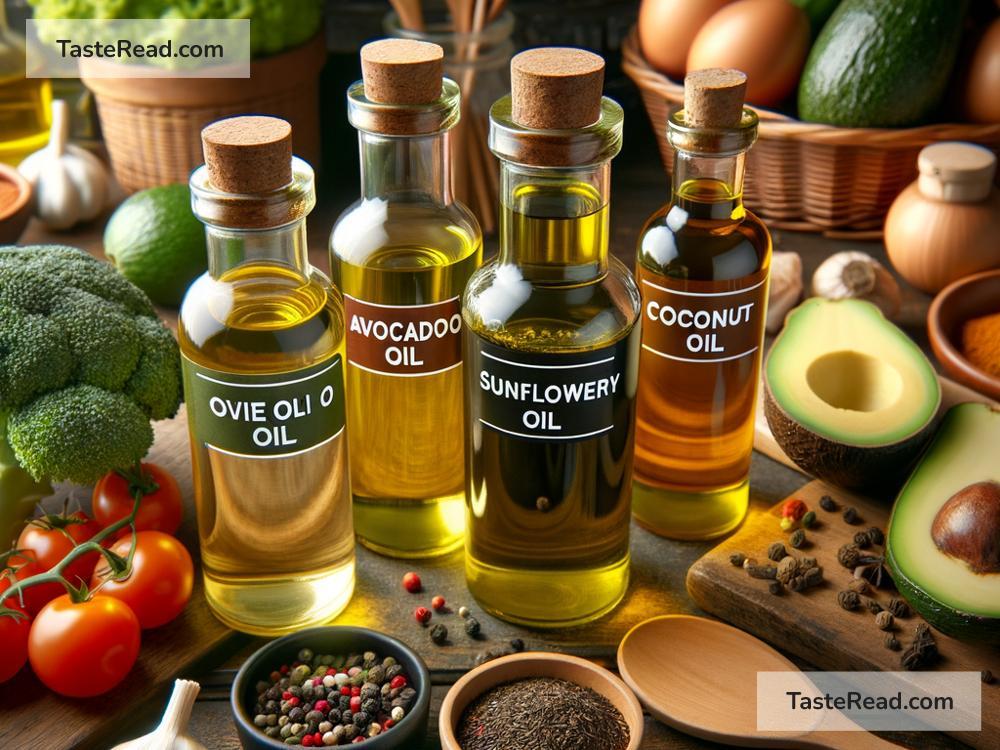Understanding the Impact of Cooking Oils on Health
Cooking oils are a staple in almost every kitchen. Whether you’re frying eggs, sautéing vegetables, or baking treats, cooking oils are essential in preparing delicious meals. But have you ever stopped to think about how these oils affect your health? Not all oils are created equal, and the type, quality, and quantity you use can have a significant impact on your well-being.
In this blog, we’ll break down the basics of cooking oils, how they affect your health, and how you can choose the right oils for your lifestyle.
What are Cooking Oils?
Cooking oils are fats extracted from seeds, nuts, fruits, and even animals. They are commonly used for cooking, adding flavor, and even preserving food. Some of the most popular oils include olive oil, canola oil, sunflower oil, coconut oil, and butter.
Each type of oil has its own unique composition of fats, including saturated fats, unsaturated fats, and trans fats. These fatty components are what make one oil healthier or less healthy than another.
Types of Fats and Their Effects on Health
Understanding cooking oils starts with understanding the types of fats they contain:
-
Saturated Fats: These fats are usually solid at room temperature and are found in oils like coconut oil, palm oil, and butter. Saturated fats have been linked to an increase in bad cholesterol (LDL), which can raise the risk of heart disease when consumed in excess. However, some research suggests that not all saturated fats are harmful, and moderation is key.
-
Unsaturated Fats: These are generally considered the “healthy fats” and are found in oils like olive oil, canola oil, and sunflower oil. Unsaturated fats are divided into:
- Monounsaturated fats (found in olive oil and avocado oil): These can help lower bad cholesterol and increase good cholesterol (HDL).
-
Polyunsaturated fats (found in soybean oil and flaxseed oil): These include omega-3 and omega-6 fatty acids, which are essential for brain function and heart health.
-
Trans Fats: These are artificially created fats found in hydrogenated oils and some processed foods. Trans fats are considered harmful because they not only increase bad cholesterol but also lower good cholesterol, leading to a higher risk of heart disease.
How Cooking Methods Impact Oil Healthiness
The way you use cooking oils can also affect their impact on health. When oils are heated to high temperatures (like during frying), they can break down and release harmful compounds. This is why it’s important to choose oils with a high “smoke point” for high-heat cooking. The smoke point is the temperature at which oil begins to burn and produce toxic substances.
For example:
– For high-heat cooking: Oils like avocado oil, canola oil, and sunflower oil are ideal because they have higher smoke points.
– For low-heat cooking and salads: Oils like extra virgin olive oil are a great choice because they retain their nutrients when used in raw or light cooking.
Benefits of Cooking with Healthy Oils
When you choose healthier oils, you can enjoy several benefits:
1. Heart Health: Oils rich in unsaturated fats, like olive oil, can lower bad cholesterol levels and reduce the risk of heart disease.
2. Reduced Inflammation: Some oils, like those containing omega-3 fatty acids (e.g., flaxseed oil), can combat inflammation, benefiting joint health and reducing chronic disease risks.
3. Better Nutrient Absorption: Oils help your body absorb fat-soluble vitamins like A, D, E, and K.
4. Improved Skin and Hair: Certain oils contain antioxidants and healthy fats that promote glowing skin and healthy hair.
Common Cooking Oils and Their Health Profiles
Here’s a quick overview of some popular cooking oils:
-
Olive Oil: Known for its heart-healthy properties, olive oil is rich in monounsaturated fats and antioxidants. Extra virgin olive oil is the least processed and the healthiest option.
-
Canola Oil: A versatile oil with a neutral flavor, canola oil has both omega-3 and omega-6 fatty acids, making it a good choice for cooking.
-
Coconut Oil: This oil contains more saturated fats, but it’s popular for its distinct flavor and is often used in moderation for baking and frying.
-
Sunflower Oil: High in vitamin E and polyunsaturated fats, sunflower oil has a higher smoke point, making it good for frying.
-
Avocado Oil: Packed with monounsaturated fats and vitamin E, avocado oil supports heart health and works well for high-heat cooking.
Tips for Choosing and Using Cooking Oils
- Moderation Matters: Even healthy oils are high in calories. Use them in moderation to avoid weight gain.
- Read Labels: Check for oils labeled “cold-pressed” or “extra virgin,” as these retain more nutrients and antioxidants.
- Store Properly: Keep oils in a cool, dark place to prevent them from going rancid.
- Avoid Reusing Oil: Reheating used oil can produce harmful compounds. Always use fresh oil when cooking.
Conclusion
Cooking oils play a big role in your diet and overall health. By understanding the differences between oils and how they impact your body, you can make better choices in the kitchen. Focus on oils with healthy fats, use them wisely, and pair them with a balanced diet for optimal health benefits. Remember, small changes can lead to big results over time!
So, the next time you reach for that bottle of oil, think about not just what’s best for your recipe, but also what’s best for your health.


